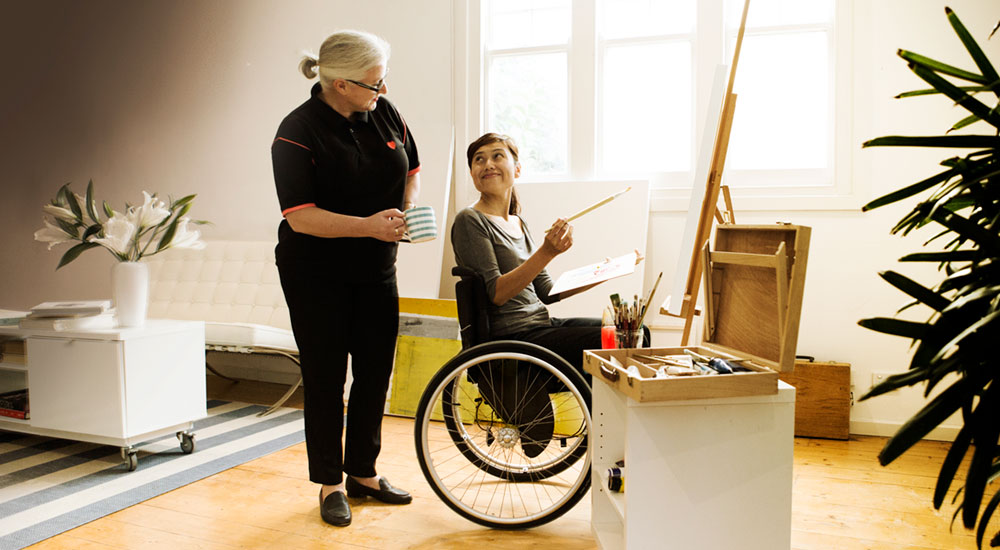Being a caregiver to a loved one is no easy job, albeit an incredibly rewarding experience.
Taking care of a loved one with dementia is another level of challenge in itself, with many finding it overwhelming and draining to say the least. Why is that so?
Perhaps understanding the illness in a little bit more depth will help you recognise the difficulty that lies behind caregiving for a loved one with dementia.
What is Dementia?
Dementia depicts a general decline in a person’s cognitive function. It affects the brain (a progressive biological brain disorder to be exact), which makes remembering things more and more difficult for the patient.
It’s not just the memory issues – a person with dementia will find it increasingly difficult to think clearly, communicate with others, and eventually take care of themselves. Further, dementia can cause mood swings and impair with decision-making, and there will be behavioural and personality changes down the road.
To care for a person with a condition like this means the probable dealing of different situations every day. What works today may not be effective the next day, or forever. For many, they do not have any experience nor training in caring for dementia patients, which is why this can be extremely tasking to them.
10 Tips on Caring for People with Dementia
Here are 10 practical strategies that will help your situation if you are providing dementia caregiving:
1. Communication – Be Open to New Ways of Interacting
This is the first thing you have to learn. Improving your communication skills will help you navigate how to effectively respond to the challenging situations that will surely arise sometime in the future, if not already.
Limit distraction and noise when you are talking to them to get their attention. Use simple words and sentences and speak slowly. If you need to ask questions, make them simple and answerable (those with yes/no work best).
When you talk, use a reassuring tone because often, people with dementia feel confused and unsure of themselves. Responding with reassurance will ease their anxiety and this will help in getting the message across.
Be ready that they will be repeating the same question, forgetting something important or doing something inappropriate so never lose your patience but try to maintain your sense of humour instead.
2. Everyday Care
Eventually, people with dementia will need more help with simple, everyday tasks. This could include bathing, grooming and getting dressed. As a carer, you have to understand that this can be very upsetting for them, given these are simple tasks yet they need help for such personal activities.
What you can do is first set a routine for them. Fix a particular time for each activity because the brain likes patterns. If you are helping them to bathe and dress, allow them to do as much as possible themselves. Be gentle and respectful during the process, and tell them clearly what you’re going to do before taking each step.
3. Take Steps to Avoid Agitation and Conflict
Agitation is part of the game as dementia impairs how effectively the brain handles stress and confusion. It is often triggered by fear, fatigue or environmental factors, but most often it is triggered when the person feels “control” being taken away from him/her.
So allow your loved one to do as much as possible themselves while you supervise from the side. Encourage their independence and ability to care for themselves. If possible, do not expose them to new environments too frequently but instead, maintain a normal routine as much as possible. Keep things in the same place – the more the brain recognizes its environment and schedule, the more optimally it can perform.
4. Healthy and Active Lifestyle
Try to maintain a healthy and active lifestyle for your loved one as people with dementia may lack interest or have trouble starting activities.
Take a walk together every day (it’s good for you too!). Instead of one prolonged session, try to break it down into several short mini workouts. Even doing household chores, gardening, cooking or baking together will be beneficial in keeping active, but remember to match the activity to what your loved one can do.
5. Eating and Nutrition
Buy a variety of healthy food and arrange meal and snack times to be part of the daily routine. Schedule them around the same time every day and allow your loved one to eat independently if they can. Provide assistance only when necessary, and allow plenty of time for meals.
Aside from managing their diet and nutrition, it is important that you serve meals in a consistent and familiar place. Sit down and eat with them – it makes the meal more pleasant to share it with someone.
6. Home Safety
You want to give your loved one more freedom to move around independently and safely at home. To allow that, you’ll need to remove all hazardous items and add safety features around the home:
- install carpet or safety grips on stairs
- insert safety plugs into unused electrical outlets
- remove small rugs, electrical cords and any unnecessary items on the floor that can cause one to trip over
- ensure good lighting around the house
- lock up cleaning and household products
7. Recognize Dangerous Situations, Implement Precautions
Depending on how serious your loved one’s condition is, sometimes activities like driving and cooking may already be dangerous situations so these should be taken away, or at least be limited.
However, be ready that this may lead to strong emotions given these activities are often tied to one’s sense of independence. The conversation will be difficult, but it still needs to be done. Try to initiate it in a non-confrontational way and always keep their emotions in mind so as not to get annoyed yourself because that would make things worse.
8. Handling Troubling Behaviour
Speaking of strong emotions, some of the greatest challenges that comes with dementia caregiving are the personality and behavioural changes.
To handle these outbreaks, always keep in mind that it is the brain disorder that has shaped your loved one into who they are now. If you try to change or control their behaviour, it will most likely be unsuccessful because that’s just how they are, now.
So, you have to be open to seeing them as they are now, as if you’ve just got to know them. Throw away any and all previous perceptions. Instead, try to accommodate the behaviour. Change your own behaviour and be creative and flexible in your strategies to address an issue.
9. Take Care of Yourself
Know when to take a break and recharge yourself when things are taking a toll on your physical, mental and emotional health.
Consider respite care – have the professionals take over your job while you take a break. It can be as short as meeting up with friends for tea, or a vacation to get away from it all (for a little while). It will benefit yourself and the person you’re caring for, trust us.
10. Plan for the Future
One day, your loved one will no longer be able to make decisions on their own. Having to do that on behalf of them can be overwhelming, so plan ahead especially in the health care department.
We suggest doing this early on while your loved one is still capable so that they can be involved in the decision-making process. Discuss with them legal and financial matters, inclination regarding in-home care, long-term care, and finally, funeral and burial preferences.
Having had these difficult discussions done ahead and get them out of way will no doubt ease your burden in the future.



